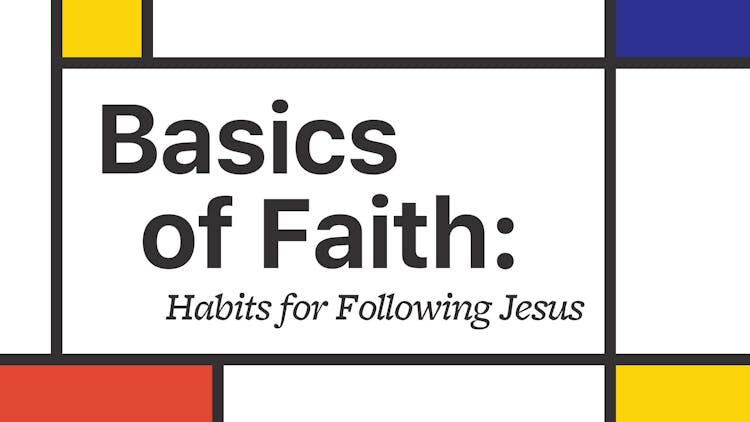If the idea of helping someone dealing with anxiety makes you anxious, you’re not alone, but you don’t have to be overwhelmed. You don’t have to, nor can you, fix anyone’s problems. But you can give your presence, love, and support—which is way more valuable anyway. So, how can we, as the church, love and lead those battling anxious thoughts?
The first thing you can do is pray. Ask God to give you wisdom because when you do, He generously gives it to us (James 1:5). Praying for wisdom for ourselves and praying for help for the person we love is more powerful than anything we can do in our own power.
Secondly, remember that you’re not a doctor, and it’s okay to ask for help. In fact, if you suspect someone is struggling with an anxiety disorder, one of the best things you can do is recommend help, like a doctor, a therapist, or your campus LGLM team.
It’s also important to recognize that there are many differences between stress, worry, fear, anxiety, and depression. Those topics often get lumped together, but they are very different. Worry can often lead to anxiety, but worrying by itself doesn’t necessarily indicate a person has anxiety.
In this guide, we’ll talk through the differences between worry, stress, fear, anxiety, and depression, warning signs of someone who may be struggling with an anxiety disorder, and practical ways to help.
What are the differences between worry, stress, fear, anxiety, and depression?
Worry tends to be something people feel emotionally and mentally, but it doesn’t necessarily lead to physical symptoms. Worry is also usually about something specific. You might worry about an upcoming job interview, but anxiety usually involves something general—feeling anxious about never finding a job.
Stress and worry are similar, but stress can include some physical symptoms as well as anxiety. Stress, like worry, is also focused on a specific external event. Let’s say you have an important test coming up. You might feel stressed about that. But stress usually passes once you’ve taken the test. Anxiety, however, continues even after the reason for stress is gone. When stress accumulates, it can often lead to anxiety.
Fear is also in response to a clear external threat, like worry and stress. You might experience fear if you’re moving to a new city and uncertain about upcoming changes. Fear can also be a healthy response to danger if it helps you make wise choices, like avoiding something harmful—for example, fear of being burned prevents you from touching a hot stove. But unhealthy fear can often lead to anxiety.
With God’s help, we can be unafraid even when there’s something to be afraid of.
It’s important to remember that God doesn’t give us a spirit of fear, and the Bible is full of verses about not being afraid. That doesn’t mean there won’t be anything to be afraid of. Life is full of overwhelming, fearful circumstances. But with God’s help, we can be unafraid even when there’s something worth being afraid of.
Anxiety can take on different forms for different people. It often causes not only mental and emotional effects but also physical effects. For some people, it may cause shortness of breath, panic attacks, trouble sleeping, stomach pain, physical illness, etc. People have their own triggers and their own responses to anxiety, so there’s no one-size-fits-all description of anxiety nor a formula to fix it altogether.
People who have depression often also have an anxiety disorder, but there’s not a clear correlation between them. However, a lot of the physical symptoms of depression and anxiety are similar. Depression is a condition that causes prolonged sadness, guilt, or shame. It may lead to feelings of numbness, fatigue, anger, irritability, or wanting to be isolated. Anxiety, however, is a prolonged or constant state of worry or fear about a general circumstance.
If you suspect someone is struggling with an anxiety disorder or depression, the best thing you can do is refer them to a doctor or therapist. If you suspect someone is in a suicidal crisis, call 911 immediately and check out this article.
Here are some common signs someone you care about may be dealing with anxiety:
- They often talk about feeling nervous, restless, or tense.
- They feel a sense of impending danger, panic or doom.
- They may have increased heart rate, breathe rapidly, or hyperventilate, which may trigger a panic attack.
- They often feel weak or tired.
- It’s difficult for them to concentrate or think about anything other than present worry.
- They’re having trouble sleeping.
- They may avoid social interactions and start isolating themselves.
- They may change their eating habits—whether that’s not eating enough or overeating.
All of us struggle at some point with fear or anxiety. But if you suspect someone you love is battling one or more of these symptoms on a regular basis, it’s probably time to recommend help.
So how can you help?
- Be a listening ear. Let them process their feelings with you without judgment and without immediately jumping in to fix everything. Sometimes people want to talk about their feelings without resolving them immediately. Don’t dismiss someone’s worries or anxieties as trivial or unimportant. Help them see that God cares about every one of their concerns (1 Peter 5:7). Help them think through what the worst-case scenario might look like, and ask them how they would handle each step. Sometimes when people name their fears and develop a game plan for facing them, it becomes less overwhelming to think about.
- Affirm their feelings. People struggling with anxiety often feel like their feelings are wrong, unimportant, or irrational. Validate their feelings by thanking them for sharing their worries with you. Affirm their bravery and vulnerability, and let them know you are here for them. People who struggle with anxiety may also feel a stigma that they don’t have enough faith, when that’s not the case. Let them know that God cares for them and wants to be with them through their anxiety.
- Ask them what they’re learning through anxiety. Similar to the previous point, don’t dismiss their anxious feelings. Don’t make them feel like they don’t have enough faith. Instead, help them identify what they might be learning through their anxiety. Struggling with anxiety can often point us to God, and that’s a great thing!
- Remember people are people to love, not projects to fix. We can’t fix anyone nor should we try. We are all mutually broken and all in desperate need of God’s redeeming grace. Don’t try to resolve all of their anxiety. When you offer solutions to everything, they may start feeling guilty if their feelings don’t immediately change. Instead, let them know you’re here to help and you’re here to listen. Listening is one of the best ways to show love and honor to someone who’s hurting.
- Pray for them and with them. On our own, we can’t heal anxiety. But we can point to the One who can. Only God has the power to make us whole again. And He has the peace they need. Read Philippians 4:6-7 together. Pray for the person to feel the peace and presence of God. Pray with them, seeking God’s peace together.
- Determine if help or intervention is needed. Know when you need to bring in people with professional experience. If someone you love is showing repeated signs of an anxiety disorder, there are many factors at play. Professionals are trained for various aspects of anxiety. Seeking help doesn’t make anyone weak—it makes us wise.
Here are some helpful resources about anxiety you can send to anyone who might be struggling:
- Articles from real people with real hope about dealing with anxiety at finds.life.church.
- Start the Anxious for Nothing Bible Plan.
- Here’s a guide for anyone struggling with anxiety.
- Watch the Anxious for Nothing message series from Pastor Craig.
- Here are some helpful Scriptures about dealing with anxiety and finding peace:


